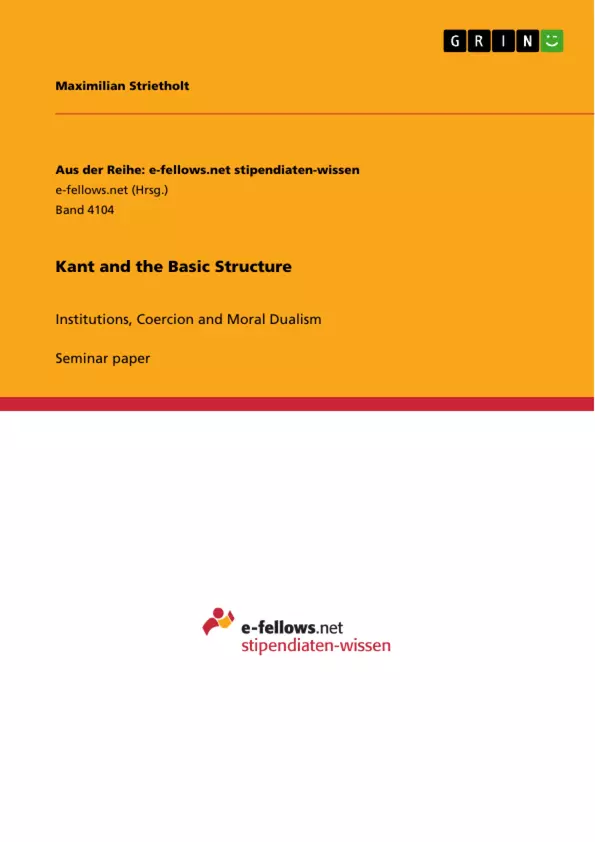Rawls’s claim that the primary subject of justice should be the basic structure of a society – I shall call this his basic structure claim - has been a central point of discussion for a variety of debates within political theory. Not only has it been attacked from both libertarians and socialists alike, but it has also played a crucial role in feminist critiques of Rawls. Above all, its importance can hardly be overstated with regard to questions about transnational justice: The cosmopolitanism-vs.-statism debate can to a large part be traced back to different conceptions of the basic structure, respectively resulting in different views about the scope of principles of justice.
In contrast to the pivotal significance of this claim, however, Rawls seems to assume rather than really justify it, which is part of why many have found it dubious at least, if not straightforward wrong. After shortly outlining the core aspects of that discussion in section 2, my aim in this paper will therefore be to develop a more profound account of the basic structure, based on a particular interpretation of Kant’s Doctrine of Right. In doing so, I seek to answer two questions. The first is: In which sense are institutions “different” subjects of justice after all? This question will be addressed in section 3 and 4. The second is: How do normative principles apply differently to institutions than they do to individual conduct? This will be the topic of section 5 and 6.
Inhaltsverzeichnis (Table of Contents)
- Introduction
- Cohen and Murphy vs. Rawls
- Rawls's circle
- Kant's Account of Institutions: Political not Metaphysical
- "Taking People as They are"
- Kant's Moral Dualism
- Conclusion
Zielsetzung und Themenschwerpunkte (Objectives and Key Themes)
This paper aims to develop a more profound account of Rawls's concept of the basic structure of society, drawing upon a specific interpretation of Kant's Doctrine of Right. The central objective is to determine how institutions, as distinct subjects of justice, require unique normative principles compared to individual conduct.
- The basic structure claim and its importance in political theory
- The justification of using coercion in the name of justice
- The relationship between institutions and individual conduct in relation to justice
- The relevance of Kant's political philosophy to contemporary debates
- The distinction between monism and dualism in normative principles
Zusammenfassung der Kapitel (Chapter Summaries)
- Introduction: This chapter introduces Rawls's basic structure claim, highlighting its significance for various debates in political theory. It outlines the paper's main questions: how institutions are distinct subjects of justice and how normative principles apply differently to them. The chapter also clarifies the paper's approach, focusing on a Kantian interpretation of the basic structure.
- Cohen and Murphy vs. Rawls: This chapter explores critiques of Rawls's basic structure claim by G.A. Cohen and Liam Murphy. Cohen argues for an inherent tension within Rawls's difference principle, suggesting that it requires individuals to simultaneously endorse and reject the principle. Murphy extends this criticism, arguing against the idea that institutions require different normative principles than individual conduct. This chapter sets the stage for the paper's Kantian account of the basic structure, which aims to address the issues raised by Cohen and Murphy.
- Rawls's circle: This chapter delves into the limitations of Rawls's account of the basic structure. It highlights the difficulties in defining the scope of the basic structure, leading to a potential dilemma: either the term is too vague or too narrow. This analysis lays the groundwork for a more nuanced and specific Kantian perspective on the basic structure.
- Kant's Account of Institutions: Political not Metaphysical: This chapter examines Kant's perspective on institutions, arguing that they are primarily political rather than metaphysical entities. It explores how Kant's understanding of coercion and law provides a framework for understanding the specific role of institutions in a just society. This chapter lays the foundation for the paper's argument that institutions are distinct subjects of justice, requiring a specific kind of normative justification.
- "Taking People as They are": This chapter analyzes Kant's concept of "taking people as they are," which emphasizes the need for institutions to account for the inherent limitations and potential for conflict in human nature. It explores how this concept relates to the justification of coercion and the development of appropriate institutional rules.
Schlüsselwörter (Keywords)
The key terms and concepts explored in this work include: basic structure, justice, institutions, coercion, normative principles, monism, dualism, Kant, Rawls, difference principle, political philosophy, legal authority, social contract theory.
Frequently Asked Questions
What is Rawls's "basic structure claim"?
It is the assertion that the primary subject of justice should be the basic structure of society—its major social, political, and economic institutions.
How does the paper use Kant to justify Rawls's claim?
The paper draws on Kant’s Doctrine of Right to develop a more profound account of why institutions require different normative principles than individual conduct.
What is the "monism vs. dualism" debate in this context?
Monism suggests that the same principles of justice apply to both individuals and institutions, while dualism (supported by Rawls) argues they are separate subjects requiring different rules.
What are the main critiques of the basic structure claim?
Libertarians and socialists, such as G.A. Cohen and Liam Murphy, argue that justice cannot be restricted only to institutions but must also apply to personal choices.
Why is the basic structure important for transnational justice?
The definition of the basic structure determines whether principles of justice apply only within a state (statism) or across borders (cosmopolitanism).
- Citar trabajo
- Maximilian Strietholt (Autor), 2021, Kant and the Basic Structure, Múnich, GRIN Verlag, https://www.grin.com/document/1187510



